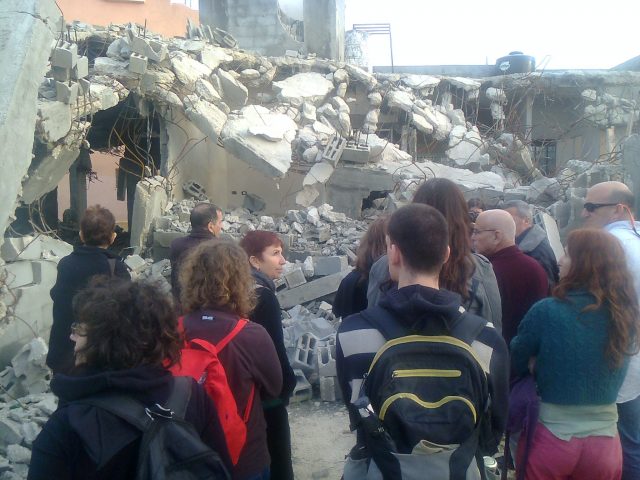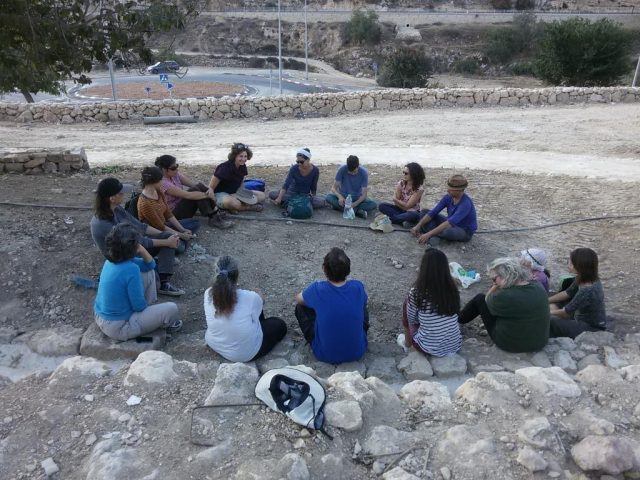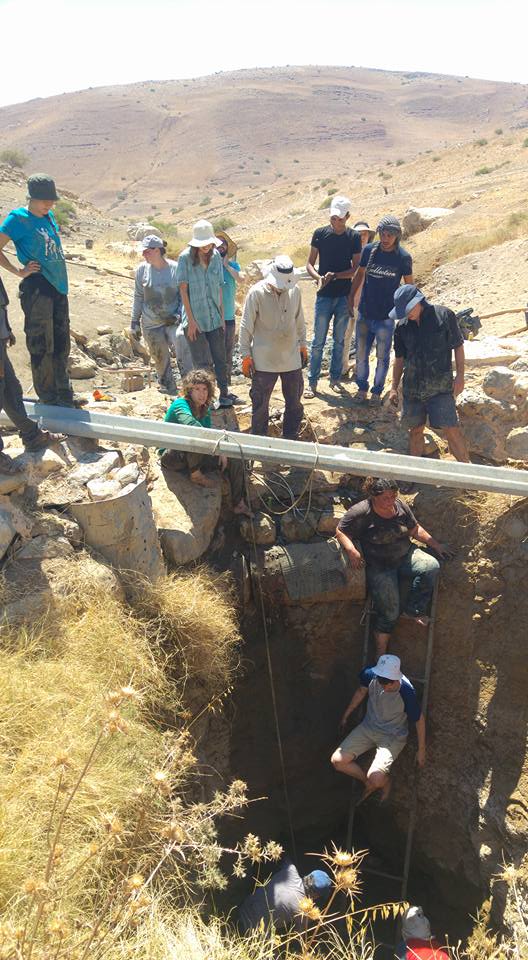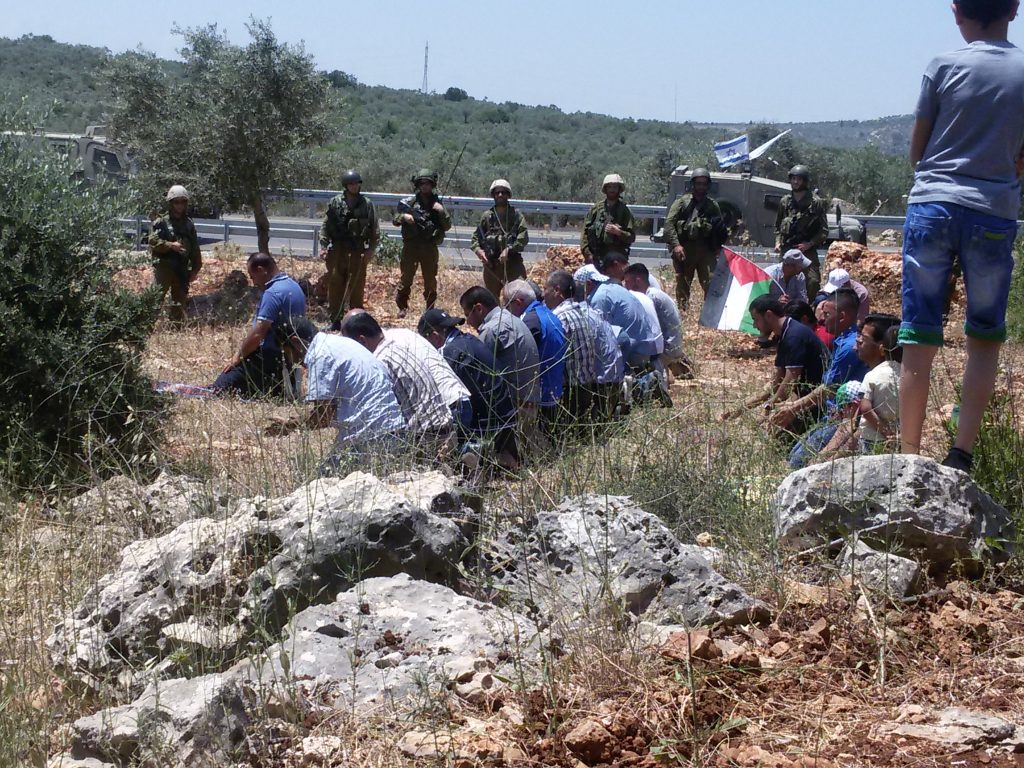City: Jerusalem
Tradition: Thai Forest
Year Founded: 2010
Number of Members: Around 60
Meeting Place: Member’s apartment
Tricycle talks to Aviv Tartarsky, a dharma facilitator:
Israeli Engaged Dharma is not just a sangha; it’s focused on humanitarian work, particularly in Palestine. How does that work?
We think of ourselves as a sangha. But we are not exclusive. So [we have members] whose main sangha is Tovana [Israel’s largest sangha], or Zen Buddhism, or Tibetan Buddhism, and they join our activities. We think those more formal sanghas are a very big resource and support for people who want to engage in the practice that we offer.
How did Israeli Engaged Dharma get started?
The catalyst was the war on Gaza at the beginning of 2009. That’s when we said we cannot ignore what’s happening; it’s impossible that dharma practice does not relate to this reality. We took some time to brainstorm. You can say that officially we started to act in 2010. So we’re now close to eight years.
What’s the makeup of your community? Is it mostly people who were born into Judaism, Christianity, or Islam, or do you have a lot of people who grew up with Buddhism?
Israel is a very segregated society. You don’t have many forums where Jews and non-Jews meet and act together. Our sangha is reflective of that, so it is predominantly Jewish. We are not necessarily satisfied with that.
What is it like to practice in Jerusalem with a backdrop of conflict?
There’s a contradiction. On the one hand, the sangha offers a safe haven and a place of goodness—we always say that sangha is a refuge and practice is a refuge. That’s even more important in a place where conflict is part of daily life. But on the other hand, we have to make a decision: do we turn it into a bubble where we turn away from challenges and don’t deal with social issues, or do we say, “No, we need to bring the goodness that we have and spread it outward?”

We were sitting one evening in a flat in the center of Jerusalem three years ago, and through the window we heard a group of Israeli Jews shouting in the street “Death to the Arabs.” We were practicing inside, being very serene. And this is a very typical example of the dilemma. What do we do if there’s a lynch mob outside shouting “Death to the Arabs”? How can we stay inside and just observe our practice when we hear such a thing happening outside?
How did you react in that moment?
In that moment, we didn’t leave the group and go outside, because unfortunately it’s not a rare occasion—this is life in Jerusalem. But I think the long-term response is that we have a group that acts in the street.
For example, about four months ago, a Palestinian family was evicted from its home because the government wanted to put Israelis in the apartment, and there were many demonstrations against this. We practiced for four hours in the morning on the theme of a safe place. And then we went out to the home of the threatened family and joined the demonstration. We were there as a direct continuation of the practice we did indoors.
Does your sangha get directly involved in the political process and lobbying, or is it more of an interpersonal activism, like making connections with people?
We see our mission as raising awareness for social issues and specifically for the reality of the occupation and the Israeli-Palestinian conflict. We want to bridge this gap between practice, which is “personal,” and the conflict and occupation, which are “political.” So we focus on human rights issues. But because our practitioners are politically very diverse—people who are more hawkish and people who are more dovish, as well as conservatives and progressives—we base our action on interpersonal connections.
We have three Palestinian communities with which we have long-term relationships. We bring practitioners who are very afraid to go into the Palestinian areas there. They’re going out of their comfort zone—they feel distrustful or have an aversion—but because we offer sangha and dharma, it feels more protective and safe. People are willing to come with us, maybe for the first time, into a Palestinian village and meet our friends.
It begins very, very simply. It can be a joint agricultural work in olive groves or other forms of agricultural work. Gradually the connection develops. Then when the Palestinians, who have become our friends, suddenly have a difficulty due to the occupation, we stand next to them.
For example, in the village of Walaja, which is right next to Jerusalem, the separation barrier is taking up a huge agricultural area that they want to turn into a resort for Israelis. The government wants to take it away from the Palestinian village that has been farming it for generations. We did not set out to be activists there, but we got to know the people who own this land, and we cannot just let this happen.

There is another village where there has been a collective punishment now for two, three weeks, with army raids against the whole population because there is some problem there. And again, it’s people we know; it’s people we care about. So we join them on the nights when they are anticipating an army invasion. This can sound very radical, but it’s all based on the interpersonal connection.
What are the three Palestinian communities that you work with?
Near Jerusalem it’s a village called Walaja. More north, it’s a village called Deir Istiya. Walaja is 2,500 people; Deir Istiya,1,400. The third is a very big area called the Jordan Valley, which comprises 33 percent of the West Bank occupied territories. And in the north there, you have very small communities. They’re living in tents without electricity and running water.
You mentioned that you are doing agricultural work. So this is real hands-on community service. It’s not just preaching and talking.

We don’t do any preaching and any talking. So where does the practice come in? We use a little bit of meditation; we use our ability to look inside and listen to build a certain kind of intention before we start activities. The intention is guided by the dharma principles of compassion, nonviolence, and interconnectedness. Before we set out to Walaja, for example, we will have 30 minutes to prepare ourselves. Likewise, at the end of the day we will take time for reflection.
Do you run into security issues? Are there places where you’ve had to abandon a project on a given day because it wasn’t safe to go there at that time?
Yes, there have been a few rare occasions. Two and a half years ago, there was a period of a lot of violence. Palestinians were attacking Israelis, and the Israeli Army was very forceful against the Palestinians. We had scheduled what we call an action retreat, when we spend a fortnight in a Palestinian village and use part of it for practice and meditation, part of it for action and work. Just as we were getting ready to go, this violence broke out, and we had to postpone our plans. So this can happen, but it’s very rare.
But on the other hand, you know, we were participating in a weekly nonviolent demonstration in Deir Istiya, and the army began to target us.
Really?
Thankfully, we’re Israeli citizens. We’re not really in danger, but we became a target for the soldiers who wanted to arrest us and who tried to limit our freedom of movement. And really to catch us and to imprison us. We were standing together with the Palestinians, and in front of us were soldiers with their guns and their stun grenades. In one situation they were using the stun grenades and the teargas against the Palestinian demonstrators and us.
And, again, we had the support of practice. The centeredness that meditation gives you is so important; it gives you the ability to look at how you act in real time and to catch yourself and to calm down. Aggression comes up so easily. But when we come with an attitude of compassion and of caring for everyone, it’s a completely different behavior. So it’s very powerful.
Your sangha is mostly Israeli citizens, so a lot of them probably served in the military themselves. Does the sangha and your experience in the communities change the way they see the conflict?
We have people who are part of our sangha that were active in Deir Istiya as soldiers. They came with weapons, and they were very direct part of the occupation. Now, a few years later, they are coming as guests. It brings up so much for them. The first time, they are usually very apprehensive, because as a soldier you view Palestinians and the village as a danger zone, where it’s very hostile. That’s their conditioned view. Gradually, they see it’s different, and they can let go of that. And then a lot of guilt and shame arises regarding things that they did as soldiers.
Where do you see the sangha being a year from now?
I think the prospects are very, very bad. Today, no one can offer a bright future, certainly not in terms of a year from now. Things are just getting worse. I’m saying this because I think we need to be realistic, and we need to know that the forces supporting occupation are much stronger today. So there is no effective strategy to turn the wheel around at this point.
We are a group dedicated to human rights, and we see the rights of people we really got to know and care about being violated every day. It can drain you, and it can make you angry. You see so much pain—but your society, the people you go to work with, your neighbors, maybe even your family, they don’t care about this pain. For them, it’s nothing. For them, it’s maybe even justified.
So we continue what we are doing on a very down-to-earth level, and we know we cannot look to a year from now. We can only look to what’s happening today in the present moment.
Tricycle wants to learn about your sangha! Write news@tricycle.org to be considered.
Thank you for subscribing to Tricycle! As a nonprofit, we depend on readers like you to keep Buddhist teachings and practices widely available.
